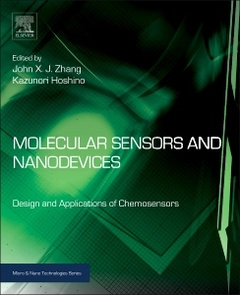Molecular Sensors and Nanodevices Principles, Designs and Applications in Biomedical Engineering Micro and Nano Technologies Series
Auteurs : Zhang John X. J., Hoshino Kazunori

1. Introduction to Molecular Sensors Introduction2. Fundamentals of Nano/Microfabrication and Scale Effect 3. Microfluidics basics and total analytical systems4. Electrical transducers: electrochemical sensors and FET-based molecular sensors5. Optical transducers: optical molecular sensors and optical spectroscopy6. Mechanical transducers: cantilevers, acoustic wave sensors and thermal sensors 7. Implantable sensors
Engineers, life scientists and students working in the multidisciplinary area of biomedical device engineering; medical professionals and researchers.
Dr. Zhang’s research focuses on integrating Micro-electro-mechanical Systems (MEMS), nano-materials, micro-imaging and biosensors to provide innovative solutions to critical healthcare issues. Dr. Zhang has actively engaged in teaching new concepts and methods in these emerging biomedical engineering frontiers and has demonstrated innovation and excellence in engineering education. The materials presented in this textbook are based on his lecture notes while teaching a popular course on molecular sensors and nanodevices at UT Austin for the past 8 years.
He has a track record for developing both core and emerging engineering curriculum along with developing well-funded research programs with fellow students. Among his numerous awards, Dr. Zhang received the Wallace H. Coulter Foundation Early Career Award in Biomedical Engineering, NSF CAREER award, DARPA Young Faculty Award among many others. To recognize his accomplishment in research and education, Dr. Zhang was selected to attend the prestigious US National Academy of Engineering, Frontiers of Engineering (NAE FOE) program in 2011, the NAE Frontiers of Engineering Education (NAE FOEE) program in 2012, and subsequently China-America Frontiers of Engineering Symposium (CAFOE) program in 2013.
As an active member in his professional community, Dr. Zhang has served on numerous international conference organizing committees and editorial boards. He is an editor for ASME/IEEE Journal of Microelectromechanical Systems (JMEMS) and an associate editor Biomedical Microdevices.
Kazunori Hoshino received his PhD degree in mechanical engineering from the University of Tokyo, Tokyo, Japan, in
- Reviews of state-of-the-art molecular sensors and nanotechnologies
- Explains principles of sensors and fundamental theories with homework problems at the end of each chapter to facilitate learning
- Demystifies the vertical integration from nanomaterials to devices design
- Covers practical applications the recent progress in state-of-the-art sensor technologies
- Includes case studies of important commercial products
- Covers the critical issues of implantability, biocompatibility and the regulatory framework
Date de parution : 10-2018
Ouvrage de 512 p.
19x23.3 cm
Ancienne édition
Accéder à la nouvelle édition.
Date de parution : 12-2013
Ouvrage de 512 p.
19x23.3 cm
Ancienne édition
Accéder à la nouvelle édition.
Thèmes de Molecular Sensors and Nanodevices :
Mots-clés :
DNA; scaling; microfabrication; microfluidics; electrochemical sensors; optical transducers



